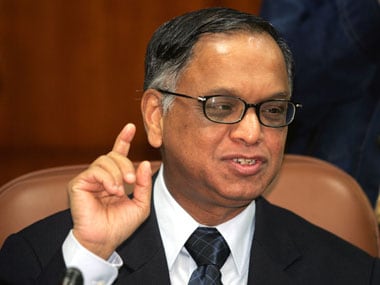Infosys co-founder NR Narayana Murthy has urged the top 100 Indian companies to allocate 10 percent of their profits towards corporate social responsibility with a focus on areas like public health, nutrition, science and research and education.
Speaking at a panel discussion organised by Business Standard, he said, the companies could allocate an additional 8 percent "as against the current 2 percent of the profits earmarked for CSR" under Section 135 of the Companies Act, to achieve these goals, he added.

File image of Narayana Murthy. Reuters.
Murthy, a trustee of the Infosys Foundation, also said that he wouldn't mind sitting down with the chief executive officers of all the top 100 companies to achieve this goal.
"Let us be very clear, being rich in a poor country is not much fun. This may seem a little bit outlandish, but I think these are the kind of discussions we must have."
"If we can contribute towards making this a better society, I feel all of us will be much happier," he added.
Murthy stressed that the private sector needs to play a bigger role in Indian science and technology research.
According to a Business Line report, India's spending on scientific research, as a percentage of GDP, has been stagnant at 0.69 per cent during the last three years, which is way lower than developing countries, who according to Department of Science and Technology, spend more than than 2 percent of their GDP in R&D.
Not just that, among BRICS countries, India was ranked at the bottom in terms of percentage of GDP spent on R&D, the report adds. The situation has remained dismal even though "India's gross expenditure on research and development (GERD) has been steadily increasing over the years, and has tripled in a decade from ₹24,117 crore in 2004-05 to ₹85,326 crore in 2014-15", it adds.
Murthy also said that India must improve the contribution of taxation towards GDP from the current 11.5 percent to 16-18 percent in order to reduce inequality in the country, and to achieve, he recommended that increasing the tax rates at the highest marginal levels and adding more people into the tax net.
"Unless you have money, there's no way you can solve these problems," he added.
http://www.firstpost.com/business/top-100-indian-companies-should-allocate-10-of-profits-towards-csr-says-narayana-murthy-4297941.html
No comments:
Post a Comment